93 Search Results for mini schedule
March 24, 2012
by Robin Parker -
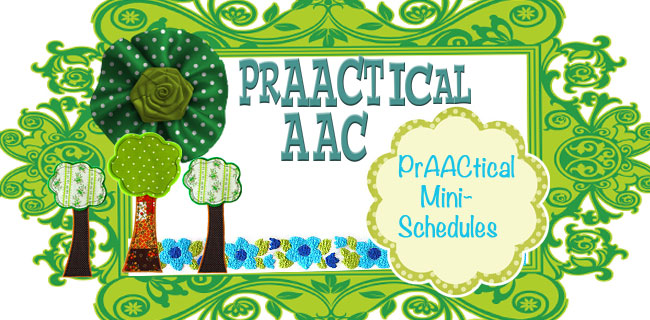
We were looking for some specific resources for a distant colleague. We wanted to get as much good information as possible because this colleague was not in our field but in another department that has direct impact over work. We do not necessarily see ‘eye to eye’ on many issues so we thought it might be helpful to our working relationship. In the process, a young man and his family would get some much-needed support. In our exploration, we found some great new videos about schedules- our topic of the month. We found several very prAACtical videos by the Watson Institute about mini schedules. We have found mini schedules to be very helpful for activities of daily living, community activities, leisure time activities and even in special event activities. We love that the Watson Institute put these on you -tube for everyone to learn from. They even have a you-tube video... [Read More...]
February 13, 2023
by Carole Zangari -
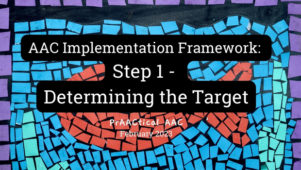
Today, we continue our series sharing an AAC Implementation Framework for classrooms, featuring guest author, Vicki Clarke. In her initial post, Vicki shared the contours of the framework. In this post, she digs into the specifics, with prAACtical strategies and downloadable forms that you may find helpful. Don’t miss the video at the end. :::::::::::::::::::::::::::::::::::::::::: AAC 101 Steps of Learning: Step One- Target In Step One, we will be determining which words and messages we need to specifically target for instruction. We often complete the step, not only for targeting specific words and messages, but also when we are first designing the AAC system that our students will be using. We will use three techniques to choose our target words and messages: Consider which words and messages are important to the individual student, their family, friends, and teacher. We will be asking all of these partners for their input as we... [Read More...]
January 31, 2022
by Carole Zangari -
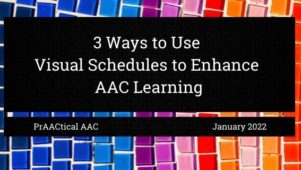
Visual schedules are a go-to strategy for helping AAC learners understand the plan for therapy or instructional session or a whole day. They have great utility beyond that, though. If you’re looking for ways to increase your use of this evidence-based strategy, here are some ideas to consider. Create a Visual Representation of an Activity: A powerful way to build understanding of and cooperation with an activity is to show what will be happening. This is particularly helpful when doing an activity that has a logical sequence or set of steps to be followed, such as making a smoothie or building a Lego car. We can create and teach the use of mini schedules depicting each element of the process to help our AAC clients/students become more comfortable and independent with the process. Parts of a Problem-solving Process: When AAC learners confront challenging situations, particularly those with a social or... [Read More...]
March 11, 2019
by Carole Zangari -
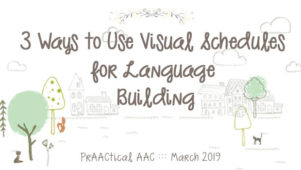
Visual schedules are powerful tools for supporting comprehension, reducing anxiety, and helping learners with AAC needs become more independent. They can also be used to build receptive and expressive language. To do that, though, the use of daily or mini/task schedules has to be part of an interactive experience, not an independent activity. If you’re willing to use schedules for language building, here are some ideas to consider incorporating. Sentence Building: This is an easy one. If you are working with an AAC learner who communicates primarily with one word/symbol at a time, slow down and take time to model short sentences every time you check the schedule together by adding a verb (e.g., GO to LifeSkills; EAT lunch, PUT AWAY your backpack). Once you’ve established that routine, you can pause to elicit those same sorts of sentences from the AAC learner. Verb Tense: As you use the schedule... [Read More...]
May 22, 2017
by Carole Zangari -
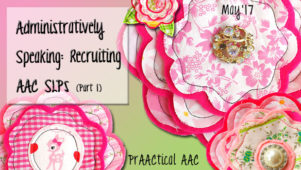
In a great many places, SLPs are in short supply. SLPs with specialized skills, such as those who can support students with AAC needs, are even harder to find. How can program administrators find, and, even more importantly, retain qualified SLPs? In this series, we share a few thoughts on the topic of space. One of the most meaningful things that an administrator is pretty simple: Ensure that the SLP has appropriate space in which to work. This basic requirement is frequently overlooked, particularly in educational settings. In schools, the SLP space is sometimes transient (e.g., M/W/F in the psychologist office, T/Th in the OT/PT area), inadequate (e.g., former book storage closet), or inappropriate (e.g., noisy environment, too small to hold groups). Sometimes, the space for SLP work is completely nonexistent. In the past few weeks, I’ve heard from SLPs who are expected to function without a dedicated workspace beyond... [Read More...]
June 29, 2016
by Carole Zangari -
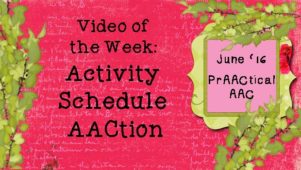
Over the years, we’ve written quite a bit on the prAACtical powers of visual schedules. Activity schedules, known also as mini schedules or task schedules, are great ways to help AAC learners understand what will be happening in a particular activity. Understanding what events will take place helps us all better prepare ourselves for active and appropriate participation in those events. In today’s post, we feature a number of short videos with information on and examples of this strategy. Thanks to the Watson Institute for creating and sharing these videos. Going to the Doctor’s Office Going to the Library Going to Physical Education (PE) Class Going to a Fast Food Restaurant Getting Ready for Bed
September 16, 2015
by Carole Zangari -
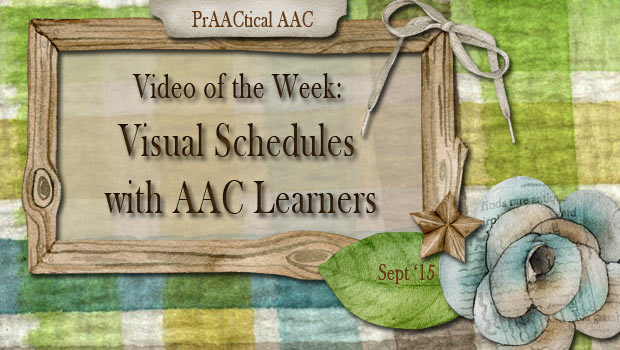
While our therapy sessions are highly individualized to meet the needs of specific individuals, there are a couple of strategies that are effective with almost every learner on our caseloads. Topping that list is the use of visual schedules. Whether it is a written agenda, a picture schedule for the session, a mini schedule for the parts of an activity, or an object schedule for the day’s events, this is one of the few strategies that has something to offer every learner. We’ve written before about this topic. In this post, you can find links to many of the topics we’ve addressed about making and using them. Today, we’ll look at a few videos on the use of this strategy. To get us started, here’s a video of Ann Syrstad sharing information about using this evidence-based intervention for individuals with ASD. Next, we head to Malaysia, where the Early Autism... [Read More...]
January 16, 2014
by Robin Parker -
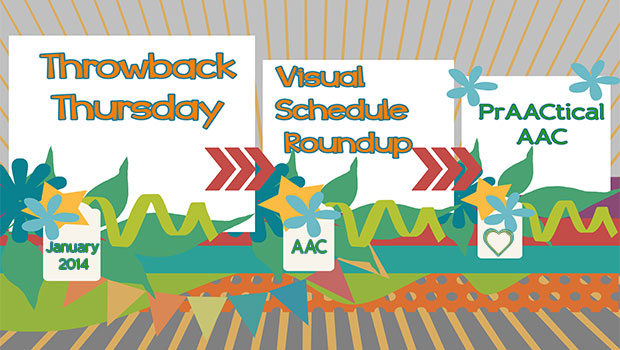
As times goes on in the academic year, we often think that everyone knows their schedules. But remember, knowing and seeing are two completely different things. For this Throwback Thursday, we wanted to go over visual schedules of all types to remind ourselves not to back off with schedules (all types) even if it seems everyone is transitioning well and knows their schedules. We wouldn’t want anyone to take away our day planner…. even when we knew our schedule. What’s the Connection- Core Words & Schedules Visual Schedules 411 Get Organized for the New Year: 5 Visual Schedule Apps Schedule Changes A Myth About Visual Schedules A PrAACtical Myth Lives On.. Again Visual Schedule Myths Live On and On… Power of the Visual Planner Schedules and Choices Riddle Me This AAC at Home: Visual Schedules and Supports Building Complex Schedules Ideas for Teaching the Use of Schedules PrAACtical Mini-Schedules Video... [Read More...]
January 3, 2014
by Robin Parker -
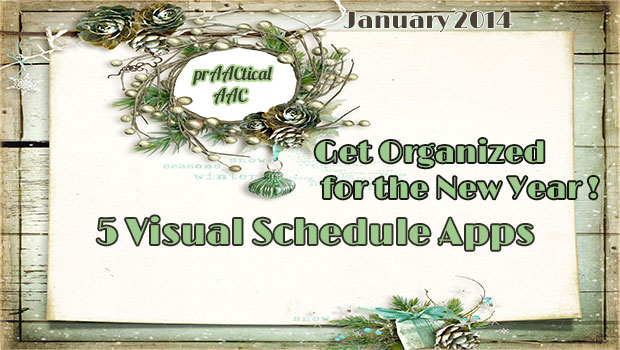
It’s a New Year- 2014. Most of us use schedules– even when we know and accept the schedule. Many of us use schedules even though we do not have ‘transition issues’. However, ‘seeing’ our schedules often helps decrease anxiety and assure us the day will be ok because even if there are some ‘not so great’ activities, most of what we do is fairly good. Schedules can be created by using materials ranging from no-tech to high-tech. You can teach talking about past, present, and future events with schedules. You can also use schedules to teach core words. Here are 6 great visual schedule apps to help with ‘teching’ up the process. By ‘teching up’ the process, we also can add to independence so ALL learners can create their own schedules. We think it is important to let you know that ALL of the app developers provide information about... [Read More...]
July 11, 2013
by Robin Parker -
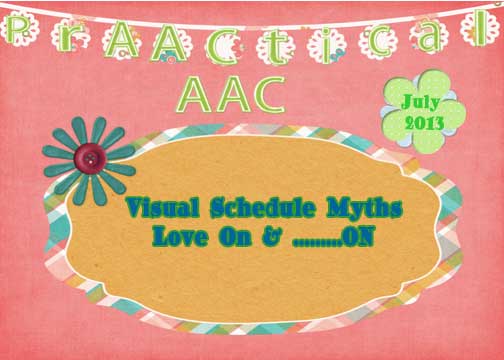
There are many myths about visual schedules for learners with special needs. Those myths multiply for older learners as well as for learners who are thought to have higher or lower skills. It is amusing to us (in a not really funny way) that these myths don’t typically extend to the SLP’s, educators, or other professionals and THEIR schedules/day planners. We have heard a lot of visual schedule myths in the last couple of weeks, which means the topic may need some re-visiting. Here are some TRUTHS about visual schedules. Please share if these myths come up in your area. Visual Schedules Increase INDEPENDENCE– Independence is supported when you can follow a visual schedule and do not need another person with you to tell you the steps to complete a day or a task. Independence is also facilitated when you can check for yourself when an event is happening rather than... [Read More...]









